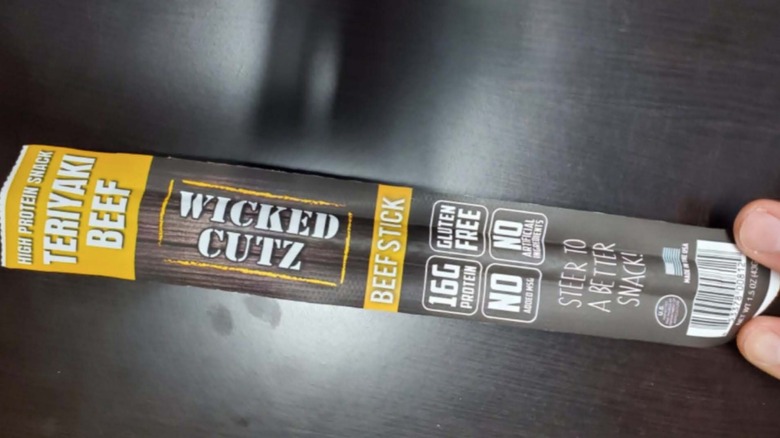The Reason Frickenschmidt Foods Is Recalling Its Teriyaki Beef Sticks
Frickenschmidt Foods started out as Lockwood Packing Company in Lockwood, Missouri, in 1987. It grew into a larger operation focusing on beef jerky and evolved into the 30,000 square-foot facility it operates today, according to the company's website. The company is known for its retail beef jerky and snack sticks, plus its private-label branding.
Recently, Frickenschmidt Foods ran into an issue with their Teriyaki Beef-flavored Wicked Cutz snack sticks. The sticks are a combination of beef and pork seasoned with soy sauce and brown sugar, according to the snack sticks' product page. The brand was forced to pull about 5,795 pounds of the sticks in a product recall, according to the USDA. According to Meat and Poultry, the company's distributor caught the issue, which triggered the product pull. A food recall can be due to bacterial or foreign material contamination or undisclosed allergens in the food (via The Cleveland Clinic), but what was the reason in this case?
A misbranding error caused the recall
Thrillist reports that the recall was due to "misbranding" on the packaging. While no recall is good, we can all let out a sigh of relief that it's thankfully not an issue of contamination or a bacterial outbreak like E. coli. The error on the label was still a serious one: The sticks were labeled as "gluten-free," but the ingredients list includes wheat ( via Meat and Poultry.) The FDA categorizes wheat as one of the eight major food allergens that account for 90% of food-based allergic reactions along with things like eggs, milk, peanuts, tree nuts, fish, shellfish, and soy.
For people with Celiac disease, gluten intolerance, gluten sensitivities, and wheat allergies, accidentally ingesting a wheat product can be incredibly uncomfortable and sometimes dangerous. Symptoms can include gastrointestinal distress, fatigue, anemia, rash, joint pain, and cognitive impairment, among other things (via Mayo Clinic). Because of the danger of intense reactions, Congress has passed the Food Allergen Labeling and Consumer Protection Act of 2004 that requires brands to label when any of the allergens are present. Thankfully, according to the USDA, there have been no reports of illness or reaction from the mislabeled batch.

